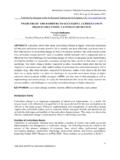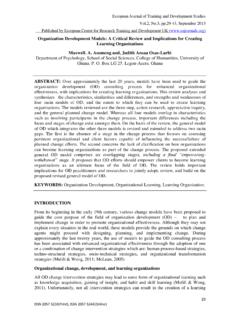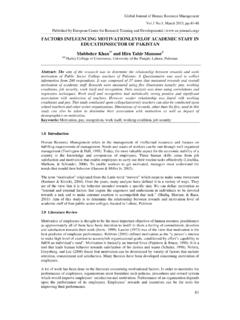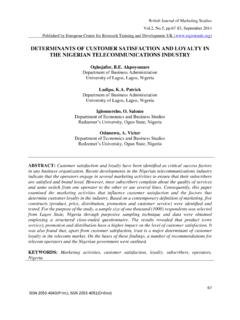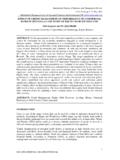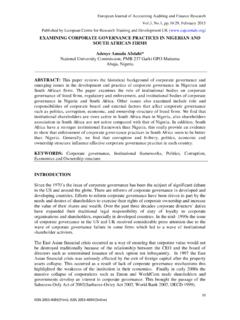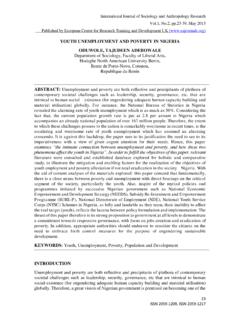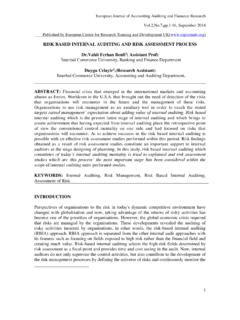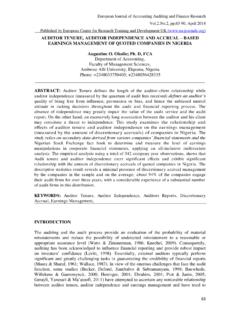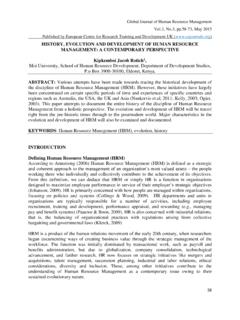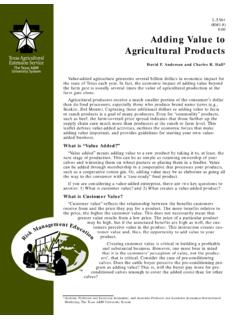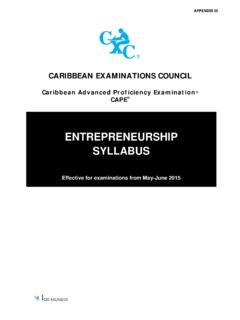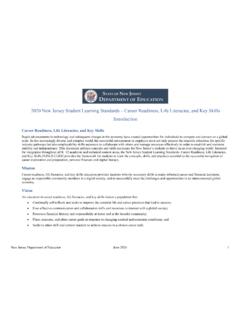Transcription of FINANCIAL MANAGEMENT OF MICRO, SMALL, AND …
1 International Journal of small Business and Entrepreneurship Research , , , January 2020 Published by ECRTD-UK Print ISSN: 2053-5821(Print), Online ISSN: 2053-583X (Online) 53 FINANCIAL MANAGEMENT OF micro , small , AND MEDIUM ENTERPRISES IN CEBU, PHILIPPINES Jose Marie M. Anoos Cebu Technological University Judy Ann O. Ferrater-Gimena ORCID No. 0000-001-5352-8253 University of Cebu Jonathan O. Etcuban Cebu Technological University Aahron M.
2 Dinauanao University of Southern Philippines Foundation Philip Joel Macugay University of Southern Philippines Foundation Lolita V. Velita Cebu Technological University ABSTRACT: The micro , small , and Medium Enterprises (MSMEs) play a significant role in developing the Philippine economy by reducing poverty and creating jobs for the country s growing labor force. This study aimed to unveil the FINANCIAL MANAGEMENT practices and challenges confronting the MSMEs in Danao City, Philippines.
3 This research applied the descriptive correlational research method and conducted among the MSMEs that are operating in Danao City, Cebu. The respondents were the 354 owners and employees of MSMEs. They are chosen using the cluster-sampling technique. This investigation further utilized a researcher-made survey tool to gather vital information on the profile, FINANCIAL MANAGEMENT practices, and challenges faced by the MSMEs. Frequency, simple percentage, weighted mean, Chi-square test of independence, and ANOVA were used to treat the gathered data.
4 The study revealed that the FINANCIAL MANAGEMENT system was moderately practiced. It was concluded that the MSMEs MANAGEMENT does not practice the generally accepted standards on the FINANCIAL MANAGEMENT and control of the business, which poses some threats on its sustainability considering that their predominant size, the volume of assets, and revenue earned is low. The researchers strongly recommend that the local government officials enact city ordinance on the vital role of MSMEs in complying with the governmental regulations to improve business transactions in regional offices use the proposed position paper.
5 KEYWORDS: FINANCIAL MANAGEMENT , MSMEs, descriptive study, Philippines International Journal of small Business and Entrepreneurship Research , , , January 2020 Published by ECRTD-UK Print ISSN: 2053-5821(Print), Online ISSN: 2053-583X (Online) 54 INTRODUCTION MSMEs had a pivotal job in building up the Philippine economy. They help decrease destitution by making employments for the nation's developing work power. They animate FINANCIAL improvement in-country and distant.
6 They fill in as essential accomplices to enormous undertakings as providers and suppliers of help administrations. They fill in as a reproducing ground for new business people and huge companies. A lively MSME part means that a flourishing and developing economy. Despite arrangements that intend to give an empowering situation to MSME advancement, the industry still faces different limitations that keep it from understanding its full development and potential.
7 There is a broad understanding that MSMEs are imperative to accomplishing respectable and profitable work as they all-around record for 66% everything being equal and make most of the new posts. Along these lines, the advancement of SMEs has been a primary region of intercession for the International Labor Organization (ILO). Its warning administrations on SME strategies are in intense interest among ILO part nations (Hughes & Haworth, 2013). Starting in 2010, there was an aggregate of 777,687 business ventures in the Philippines (Khor et al.)
8 , 2013). Of this figure, MSMEs spoke to percent with 774,664 foundations, while enormous endeavors spoke to percent with 3,023 foundations (Lanzona, 2015; De Vera, 2012). Smaller-scale endeavors contained percent (709,899) of the absolute number of MSMEs, while little and medium ventures represented 8 percent (61,979) and percent (2,786), individually (Cheng & Rabena, 2017). MSMEs are viewed as essential for a nation's commercial development, work creation, and advancement.
9 Their absence of access to financing has regularly cited as one of the significant constraints affecting their performance and competitiveness. The lack of access to funding implies that a substantial number of SMEs cannot obtain financing from banks and other sources to start, innovate, grow, and develop their enterprises (Aldaba, 2010). small businesses do not share the same FINANCIAL MANAGEMENT problems with large companies. Then again, the absence of access to financing has been distinguished as the strictest requirement for MSME development and improvement.
10 As per Cassar (2004), funding, especially from outside sources, for example, banks, turns out to be increasingly necessary as firms begin growing. Although assets have been made accessible by government budgetary organizations and private banks, most MSMEs still have difficulty accessing these funds because of: insufficient collateral, limited credit histories and banking relationships; inadequate FINANCIAL records and business plans; and high-interest rates.
